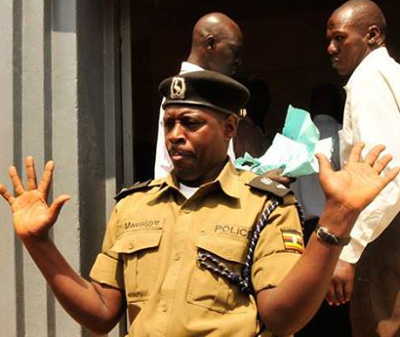Analysis
Police brutality; history of impunity erodes public trust

Embattled Old Kampala DPC Joram Mwesigye
Afande Felix Kaweesi, the police will simply transfer or even promote him.
There are numerous cases of police officers who have committed human rights violations against members of the public such as journalists and politicians but have not been charged for their actions.
The Sunrise has carried a number of stories showing impunity of the police or blatant abuse of people’s rights.
One of the most prominent ones is the attack by Uganda Police Superintendent Gilbert Arinaitwe, who in 2011, was captured on video spraying pepper and hitting the Leader of Opposition Rtd. Col. Kiiza Besigye.
After public anger, the police ‘suspended’ Arinaitwe and allegedly started investigations. Many were however disappointed when the investigations cleared Arinaitwe of any wrong doing. The notorious officer is now in charge of the force’s music department and has been seen conducting sessions at Kololo and other national functions.
In August 2014, the Director of Public Prosecutions advised the Director of Criminal Investigations Grace Akullo, to drop any plans of charging Arinaitwe saying there was no evidence to show that the means used to effect the arrest was unnecessary.
Human Rights lawyer Catherine Anite, who works with the Human Rights Network for Journalists – Uganda (HRNJ) is dismayed by the worrying trend of police brutality against journalists.
Anite said: “In my career of defending journalists, I have not seen any conclusive report where a police officer has been disciplined for violating the rights of journalists. It means the police is encouraging its officers to met out violence against journalists.”
She added: “It’s a breach of trust and statutory obligations. If these high-ranking officers are seen in committing these crimes on camera, what example are they setting for their juniors?”
While Mwesigye’s attack may be shocking, it is but a sign of the growing trend of police brutality against journalists in Uganda. The 2013 Press Freedom Report produced by HRNJ ranked Uganda Police as the number one violators of journalists rights.
The report revealed that for the third year in a row, the police had emerged as the biggest abusers of journalists rights with 85 cases, followed by just 11 cases committed by individuals in other government agencies.
Anite argues that as HRNJ, they want to step up the fight against journalists abuses by petitioning the highest office with a call to have the errant officers dismissed from the force.
“We now need to petition the police to ensure that such people are dismissed from the force. We’re going to petition the IGP to ensure that once the officer is investigated, he is not given other responsibility.,
Deputy Police Spokesperson Polly Namaye however explained that Mwesigye’s acts do not constitute the policy of the institution but rather an act of a single individual.
“As police, we’ve come out openly to say that this is not a policy of the Uganda Police Force,”
She added: “We have arrested Mwesigye and we are trying to bring to light the fact that we’re open minded.”
Namaye says that while Mwesigye will be personally held accountable for his actions, the force has decided to meet the hospital bill for the assaulted journalist in addition to replacing his damaged camera.
Some in the media fraternity are worried however that the police’s cruel handling of journalists is on a rising trend.
More importantly however, the hostile treatment of journalists by law enforcement officers, some in the media industry worry, has emboldened private individuals to commit much bigger violations against journalists and hence eroded the important foundation of public respect upon which the media thrives.
Comments


















